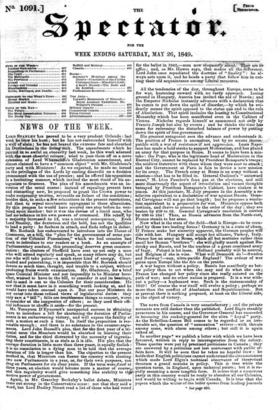All the tendencies of the day, throughout Europe, seem to
be for war, hastening onward with no tardy approach. Losing ground in Hungary, Austria has invited the aid of Russia ; and the Emperor Nicholas instantly advances with a declaration that he comes to put down the spirit of disorder,—by which he evi- dently means the spirit opposed to the status quo and to the rule of Absolutism. That spirit includes the leaning to Constitutional Monarchy which has been manifested even in the Cabinet of Vienna. Nicholas regards himself as summoned not only by Francis Joseph but also by events ; and he thinks the time has come for redressing the disturbed balance of power by putting down the spirit of free government. His greatest antagonist sees the advance and understands it. The position of France is anomalous, but by no means incozne, patible with a war of resistance if not aggression. Louis Napo- leon has made a bold stroke to support Moderatism and has placed an army for that purpose in Rome. It seems to have been a mis- take: the Pope, who is the legitimate head of Moderatism in the Eternal City, cannot be replaced by President Bonaparte's troops; the soldiers fraternize with those whom they were sent to attack ; and the Government at Paris is fain to devise a new mission for its army. The French army at Rome is an army without a mission—that has to be filled in. General Oudinot's untoward event," M. Leon Faucher's faux pas at the elections, and still more disastrously the aspect of irresolution and vacant thoughts betrayed by President Bonaparte's Cabinet, have shaken it to pieces. At this juncture, M. July proposes in the Assembly a re- solution equivalent to a declaration of war against Russia. Gene- ral Cavaignac will not go that length ; but he proposes a resolu- tion equivalent to a preparation for war. Ministers oppose both motions, and desire to proceed to the order of the day:. they are beaten by 459 to 53. General Cavaignae's resolution is carried by 438 to 184 Thus, as Russia advances from the. North-east, France stands to her arms.
Now what is the state of the field—that is Europe—to be occu- pied by these two leading forces? Germany is in a state of chaos. If France make her sincerity apparent, the German peoples will side with her. Hungary will accept her alliance, Turkey, Italy. France has an army at Rome, which all but mutinies rather than assail her Roman "brethren": she will gladly march against Ra- detzky and Russia, and he the nucleus of a great combined army of Italy. Poland is let loose. Holland probably will be neutral, and Belgium if she is wise. What will Denmark do ?—Sweden and Norway ?—nay, ultra-pacific England? The ardour of war gains upon Europe like the fire on the prairie.
A war begun without a policy. Russia has manifestly no bet- ter policy than to act when she may and do what she can; France has changed her policy since she really entered on th path of war; and no other nation is prepared. It is a war with- out a policy—a haphazard war. Such is the statesmanship of 1849 Of course the war itself will evolve a policy; perhaps no more than the conflict of Absolutism and Republicanism. But at present there is nothing proposed, at least on the Liberal side, as the object of victory.


























